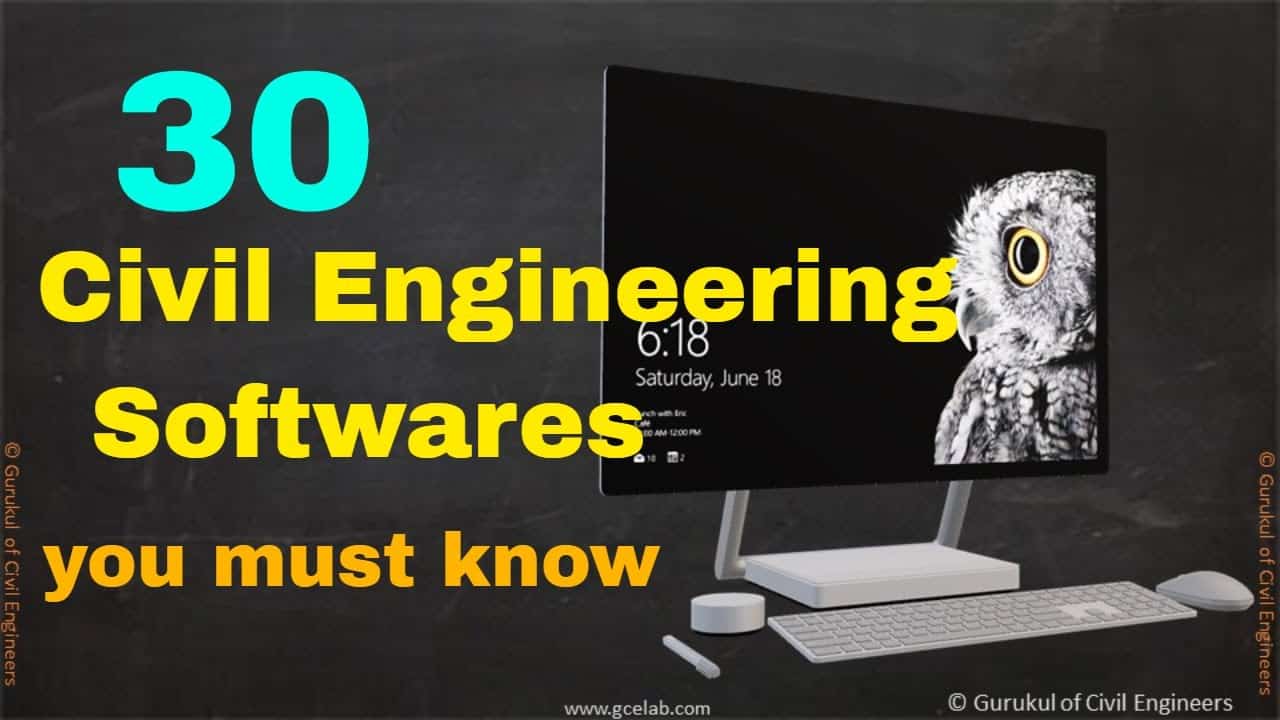30 Most demanding and useful design software for Civil Engineers
- By
- Pooja |
- September 12, 2020 |
- Civil Engineering, Building Information Modeling, Innovation,

30 Most demanding and useful design software for Civil Engineers
Table of Contents
30 Most demanding and useful design software for Civil Engineers
Civil Engineering Software for Drawing Preparation
Bridge Design/ Structure or Building Design Software
The software of Traffic Signal Design and Traffic Modeling
P-way or Track Design Software
The software of Water supply design and Modeling
Software for Geotechnical Investigation
Civil Engineering Software for BIM Modelling
If you are a newbie Civil Engineer, then trust me you must know some of the very demanding design software or modelling or operational software to manage and execute a civil engineering project. So, what are the most demanding and useful software for Civil Engineers? Hear me out!! Civil Engineering Softwares are different for each discipline so I will cover some of the very important disciplines and their software needs.
Highway Design Software
The most commonly used Highway Design Softwares are developed by Bentley and Autodesk. Both these companies are very big, advanced and cutting-edge software developing firms for the civil engineering industry.
Civil 3D
Autodesk has developed Civil 3D software as a design tool for highway design. With the growing demand for the BIM Model, Civil 3D has gained huge attraction from the industry and Civil 3D designers are in demand worldwide to cater to the need of the industry.
MX Road / Open Road
Bentley has developed MX Road and Open Road platforms to provide the same services. Along with Bentley’s MicroStation is also very demanding software for highway design. MX Road is string and Input file-based design software and it is very popular among the proficient designers in the industry. As BIM modelling gained traction, the template and corridor-based modelling get more demand and as a result, Bentley recently developed Open Road to serve their client and users. There is no right or wrong answer when it comes to selecting a preference between Bentley and Autodesk. Most of the time it depends on the client preference. Some client prefers Autodesk and some Bentley products.
Civil Engineering Software for Drawing Preparation
AutoCAD
Drawings are key deliverables of any infrastructure project. AutoCAD is the most commonly used software used to prepare drawings. Please see our blog to understand “Type of Civil Engineering Drawings for Design and Construction”. AutoCAD is developed by Autodesk and comes with enormous functionalities to prepare drawings.
MicroStation
MicroStation is another very robust software used to produce engineering drawings. MicroStation is developed by Bentley and is very popular software within the civil engineering industry.
Drainage Design Software
Windes Micro Drainage
Drainage Modelling and Design is a very important task of any civil infrastructure project. Windes Micro-drainage is the most commonly used software, developed by Innovyze. Micro-drainage provides a variety of drainage modelling options and a range of output sheets as final reports. It is also very compatible with other design tools like Civil 3D or MX road to export and import relevant data.
Bridge Design/ Structure or Building Design Software
SAP2000
SAP2000 is one the most cohesive, creative and practical structural design software. SAP2000 comes with Integrated design code features that can automatically generate wind, wave, bridge, and seismic loads with comprehensive automatic steel and concrete design.
MIDAS Civil
Midas Civil is set a new standard for the design of bridges and civil structures. Its highly established Modeling and analysis functions empower engineers to overcome common challenges and inadequacies of finite element analysis.
STAAD Pro
STAAD Pro is one of the most commonly used structural analysis and design software. It covers over 90 global steel, concrete, aluminium and timber design codes. It can make use of various types of analysis from the traditional static analysis to recent analysis like geometric non-linear study, p-delta analysis, Pushover analysis (Static-Non-Linear ) or a buckling analysis.
LUSAS
LUSAS finite element software can resolve all types of linear and nonlinear stress, composite, dynamics and thermal engineering problems. Whether you need to carry out a straightforward linear analysis of a simple structural or, a dynamic analysis of a concrete or masonry or building or a detailed geometrically nonlinear erection analysis of a cable-stayed structure, LUSAS provides all type of analysis or modelling and design solution.
ETABS
ETABS software caters to multi-story building design and analysis software. Modelling tools, code-based load prescriptions, procedures and solution techniques, all coordinate with the grid-like geometry and come with some unique features of ETABS.
Lighting Design Software
DIALux
DIALux is an adaptable solution that can be used for projects of any size. Manufacturer catalogues are offered as plug-ins and they can be downloaded from the DIALux website. This allows lighting designers to build a custom record with products from their manufacturers of choice.
AGi32
AGi32 is another lighting design software that is extensively used in the industry. Though the license is paid, the software is known for being intuitive and easy to learn. Another prodigious feature of AGi32 is that it comes with Instabase, a cloud database of lighting products with plenty of browsing tools to search for luminaires that are an exact match for your future application.
ReluxPro
ReluxPro is the core design software, featuring over 250,000 luminaires and sensors. The software is capable to carry out lighting simulations for various applications such as outdoor, indoor, emergency, roads, sports and daylighting.
The software of Traffic Signal Design and Traffic Modeling
We have covered traffic modelling and signal design software in a separate blog. Please read this for details:
P-way or Track Design Software
Civil 3D Rail
Civil 3D Rail is robust software and provides all the tools you need to manage and create geometry for a best-fit survey. It provides various options such as Cargo Point, AutoCAD Point, or on-screen input. For the best fit, you can eliminate specific elements. Civil 3D provides different alignment elements and profile units. The type of regression depends on which elements, such as tangent or a specific curve, you select.
Open Rail
Bentley Open Rail is a new, complete design and modelling software for rail network design. The software unifies design and construction from concept through commissioning and completion. The open rail application brings a high performing 3D modelling environment that empowers instantaneous and collaborative parametric modelling of rail corridors.
The software of Water supply design and Modeling
Bentley Open flow
Bentley Open Flows is a comprehensive software to plan, design, and operate water systems of any complexity. Open Flows technologies join real-time intelligence with spatial analytics, delivering perceptibility and visions to ensure optimal real-world results. Open Flows solutions comes with a wide array of water-related processes, including water distribution and investigation, sanitary and combined sewer management, and flood risk calculation.
Hydra
Hydra is used to model and design urban drainage systems. It supports estimating wastewater flows and then analyses the resulting hydraulics within the collection system. It provides tools for handling all types of flows, including sanitary wastewater, stormwater influx, rainfall-dependent infiltration, and groundwater infiltration.
Software for Geotechnical Investigation
3DEEP
3DEEP software is a fully cohesive design software package for deep excavations. Automatic topographical triangulation basically enters your survey points and 3DEEP does the remaining tasks.
ACCECALC
The Accecalc software analyses the performance of the rock slopes under seismic situations. It assesses the displacements of a rock block subject to dynamic forces, on the basis of an assumed accelerogram.
Civil Engineering Software for BIM Modelling
Autodesk Navisworks
Navisworks is a 3D BIM modelling package provided by Autodesk. Navisworks allows modellers to combine 3D models; navigate them and analyse the model using a set of smart tools including comments, viewpoint, and measurements. Various plugins and tools are used for clash detection checks, 4D time simulation, photorealistic rendering and PDF publishing.
Bentley Navigator
Bentley Navigator is a BIM Modelling software. Throughout the design, it supports you ensure the coordination of disciplines with the ability to complete clash detection for timely issue resolution. In construction, you can achieve construction simulation and work together between office, site, and field to gain insight into project planning and execution for faster determination of issues found in the field.
Tunnel Design Software
PLAXIS3D tunnel software
PLAXIS 3D tunnel design software is developed specifically for the analysis of the deformation and stability in tunnel projects. The design is fully computerized and based on robust mathematical procedures. It comes with a variety of features such as Bored tunnel and NATM tunnels, thick Lining using volume elements, symmetric and asymmetric tunnel profiles, excavation face pressure modelling, grout injection modelling, etc.
Flac3D
Flac3D is a subway tunnelling and ground environment damage calculation and control design software. it develops the empirical and analytical stochastic medium ground settlement estimate model. It predicts the longitudinal and cross-sectional ground subsidence for single and double tunnelling. An optimization technique is used for ground spatial subsidence back analysis. Lastly, an intelligent pre-processor is established to enable the subway tunnelling FALC-3d model.
Software for Project Planning
Microsoft Project
Microsoft Project is a civil engineering project management software. It is intended to support the civil engineering project manager and project planners in developing a schedule, assigning resources, tracking progress, managing the budget, and analysing assignments.
Primavera P6
Primavera P6 is Oracle’s enterprise civil engineering project portfolio management software. It comprises project management, scheduling, opportunity management, resource management, risk analysis, alliance and control capabilities, and assimilates with other enterprise software such as Oracle and SAP’s ERP systems.
Hope this blog gives you enough inside of Civil Engineering analysis and design software knowledge. It would be highly recommended to learn a few of these software’s to make a promising career as a Civil Engineer.
Admin, gcelab.com Please see our Pillar Post to know why we founded gcelab.com.
Read More:
- What are As-Built Drawings in Construction? 6 Important Points
-
What is Building Information Modeling (BIM) – 5 Important Points
-
Road Lighting Design and Design Software’s – 8 Important Points
-
6 Type of Civil Engineering Drawings for Construction- Very useful to know

Pooja
Founder at gcelab.com, Pooja is an Entrepreneur unlocking human potential. Working in the Principles of Lean Start-up, Pooja believes in Transparency and User Happiness the most. Pooja’s background in teaching gives her a sophisticated grasp on even the most tedious aspect of course building. She is passionate about people who believe that good is not enough.

